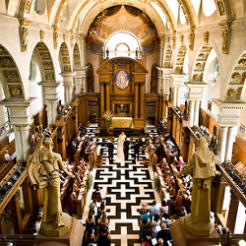The government looks intent on proceeding with its plan to begin charging VAT on approved alterations to listed buildings, though it has extended the transitional period for works already under way until 2015.
However, accountancy firm PKF contends that this concession does not go far enough to protect charities from the additional costs that will be heaped upon them by the changes.
“We were hoping for a climbdown of pasty tax proportions,” said PKF’s VAT services director Jim Gempton. “But it doesn’t look like we’ll get it.”
Chancellor George Osborne announced in the March Budget that the long-standing VAT exemption for approved works on listed buildings was an anomaly that needed correcting – similar to the VAT treatment of caravans and hot pasties.
So the exemption would be released and under the new treatment, 20 per cent VAT would be charged on all works carried out after 1 October this year unless contracts were in place or listed building consent had been applied for before Budget day, 21 March 2012.
A transition period was also proposed, meaning that if work had begun before Budget day and could be finished by 20 March 2013, it would still attract the zero rate.
Since the Budget, the heritage sector has lobbied hard for a reversal of the proposals, arguing that many projects that are already under way cannot possibly be finished by 1 October. Pamela Greener, wife of the dean of Wakefield Cathedral which is in the midst of an affected restoration project, even recorded two songs – VAT Ditty and VAT Ditty the Sequel – to try to convince the Treasury to back down.
Soon after, the government announced a special dispensation for churches and other listed places of worship, but this will not extend to other listed buildings.
In the latest proposals published on Friday, the transitional period for works already under way or where consent was obtained before Budget day, has been extended until 30 September 2015.
Gempton said this extension might benefit just one of his clients.
He said the news was disappointing. “If the aim of this move was to prevent rich people in the Home Counties paying no VAT on their swimming pools, I could have drafted that legislation for them,” he said.
He was not hopeful that further lobbying would be effective. “HMRC said in their note: ‘We acknowledge that charities and community groups will be affected but that is no reason not to go ahead with the measure, for which there are sound principled reasons, and it is hard to justify preferential treatment for altering a listed building over altering a non-listed building, whether or not a charity is involved’."
Gempton doubted there would be any u-turn on this. “Although public campaigns on the pasty tax and caravans succeeded in forcing, government u-turns, this change now looks certain to go through and is likely to cause huge damage in the long run. Works on historic buildings are bound to suffer as a result, and some buildings will go to rack and ruin.
“It is bad enough that this relief is being phased out, but not giving the voluntary sector advance notice of the 21 March deadline has left many project teams facing a 10 per cent shortfall in their funding because it will be practically impossible to get the work finished by 1 October.”
Gempton described the move as “very short-sighted” and added: “Should any government really put pasties and caravans ahead of our precious heritage?”









